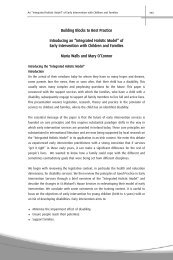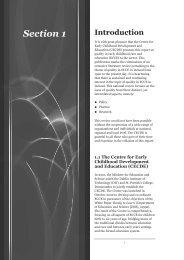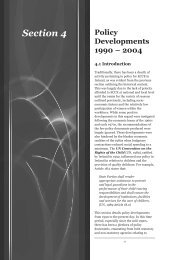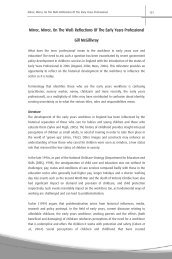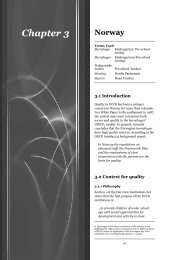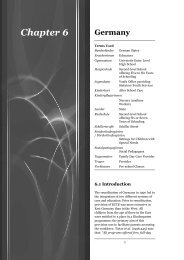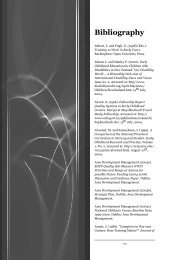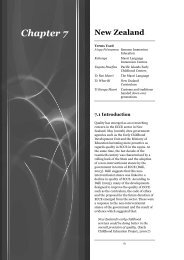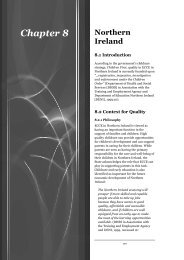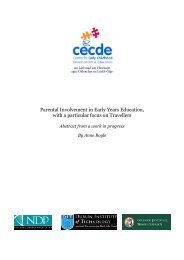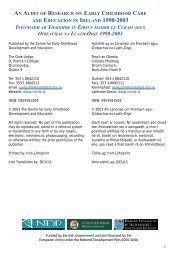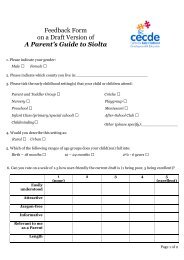Sweden - Centre for Early Childhood Development & Education
Sweden - Centre for Early Childhood Development & Education
Sweden - Centre for Early Childhood Development & Education
You also want an ePaper? Increase the reach of your titles
YUMPU automatically turns print PDFs into web optimized ePapers that Google loves.
Chapter 4<strong>Sweden</strong>new curriculum (Alvestad and Samuelsson,1999).4.3.3 Staff TrainingCameron et al. (2003) note that theeducational levels, training requirementsand working conditions of staff in <strong>Sweden</strong>are high. Förskollarare (early childhoodeducators) are employed by themunicipalities to work in publicly fundedchildcare facilities and are employed towork both in pre-schools and pre-schoolclasses. Förskollarare undergo three yearsof university training and about 60 per centof those employed in pre-schools have thislevel of training.Barnskötare (nursery worker or childcareassistant) complete three years of uppersecond level training. The OECD report(1999a) notes that it has been difficult <strong>for</strong>Barnskötare to find employment in recentyears as many municipalities try to increasequality by increasing the employment ofFörskollarare.Cameron et al. (2003) note that <strong>Sweden</strong> iscurrently integrating its occupationalmodels within the education system, basedaround the concept of a single worker (ateacher) qualified to work in pre-schools,schools and out-of-school services. Allteachers will undergo three and a half yearsof training at degree level, of which 18months will be common to all students andthe remainder is specialised according tothe intended type of teaching (pre-schoolteachers/pedagogues, free time teachersand teachers across the whole schoolrange). All staff will be known as teachers(Swedish Ministry of <strong>Education</strong> andScience, 2000). It is hoped that the:…provision of a common trainingframework should facilitate thebuilding of linkages across thedifferent phases of lifelong learning(OECD, 2001:99).Dagbarnvårdare (family day careproviders) are not required by the State toobtain any training, though it isrecommended that they complete a trainingcourse. Most municipalities have institutedspecial training of about 50-100 hours asan introduction <strong>for</strong> dagbarnvårdare. Aboutthree-quarters of those providing familyday care have either a childmindercertificate or have undergone 50-100 hoursof mandatory training from municipalemployers (Cameron et al., 2003).4.3.4 Professional <strong>Development</strong>It is the responsibility of the municipalitiesto provide in-service training <strong>for</strong> ECCEpractitioners. A variety of trainingopportunities are provided in conjunctionwith universities ranging from shortcourses to longer term courses covering avariety of subjects, including children withspecial needs, intercultural education andeducational administration (Oberhuemerand Ulich, 1997). Petrie et al. (2003:13)describe the in-service training <strong>for</strong> centrebased services in <strong>Sweden</strong> as "...welldeveloped." However in-service training isnot so developed <strong>for</strong> family day careproviders.The Lerum Competence <strong>Development</strong>Project began in 1994 and aimed to developa model <strong>for</strong> educator in-service training toimprove the quality of day care (Sheridan,1995). The training provided was based onfacilitating day care providers' awareness ofa range of issues and topics. The projectused a variety of methods to deliver thetraining including external lectures,literature studies, learning organisationsand self-evaluation. Teachers receivedtraining on their actual needs based onresults measured by the ECERS (Sheridan,1995).4.3.5 Public AwarenessIn <strong>Sweden</strong>, parents recognise and expectprovision of a high quality (Mooney et al.,54



